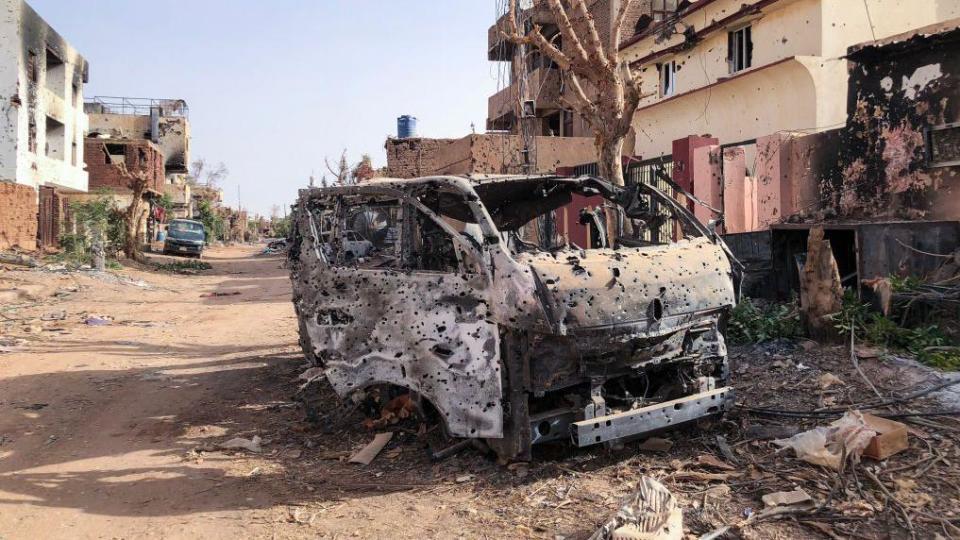Mohanad el-Balal is one of many Sudanese citizens doing everything they can to avert a devastating famine – and there is one man whose photo he will never forget.
Sadiq, a middle-aged father, clutches the arms of his wheelchair to stay upright, his painfully thin legs stretching out in front of him.
Sadig “is in a wheelchair, but he is not disabled,” says Balal: “He is so malnourished that he can no longer walk.”
Mr Balal, based in Britain, is one of the co-founders of Khartoum Aid Kitchen, which provides food to keep tens of thousands of people alive in the Sudanese capital.
When volunteers found Sadiq, “he hadn’t had a good meal in over a month,” Balal said, because he gave whatever food he could get to his children.
Unfortunately, there are many people like Sadig in Sudan right now.
The country is devastated by a war between the Sudanese army and a paramilitary group, the Rapid Support Forces (RSF), which broke out in April last year.
More than nine million people have fled their homes and everyone in the country has been affected in some way.
Things are about to get even worse.
“I expect that by September about 70% of the population will be extremely hungry,” said Timmo Gaasbeek, a food security expert who has worked in Sudan.
“That could lead to two and a half million deaths, or more. It could even be four million. There is just not enough food.”
He said the way food kitchens distribute food is a big help, but not enough.
“The war has paralyzed the country’s economy, leaving people without money,” said Amgad al-Farid, a veteran human rights activist who heads the Fikra for Studies and Development think tank.
“In addition, the RSF has captured Gezira State, which has the largest agricultural program in Sudan, and has provided much of our daily needs.
“And due to massive inflation, food imports have decreased,” explains Dr. Farid.
In short, there is not enough food, and what food there is has become terribly expensive.

Throughout the war, the BBC program Newsday received regular updates from Ahmed, a resident of Omdurman, one of the three towns that make up the capital.
In a part of Omdurman controlled by the RSF, prices have risen by 400% recently, says Ahmed, who we call only by his first name.
“My wife came back from that area and she told me that most people only eat once a day, and sometimes not at all.
‘It wasn’t like this a few months ago when looted food from factories was sold cheaply.
‘Now food has become so expensive and rare in the RSF-controlled areas.
“Hundreds of people are queuing near where I am to get lentils for breakfast. Some add water to the lentils so they can eat it at night,” Ahmed said.
He’s had to explain to his young children why they can no longer have the cookies they used to love, and how even though things are hard for his family, it’s so much worse for many others.
Ahmed said humanitarian aid rarely gets through, and people only survive thanks to food kitchens. But some of them are running out of money and can’t even buy food.
Mr Balal from Khartoum Aid Kitchen knows people who have died of hunger.
People are struggling and dying, not only in Khartoum, but also in Darfur, in Kordofan, in Gezira and elsewhere.
Ayman Musa of the NGO South Kordofan and the Blue Nile Coordination Unit spoke of people in the Nuba Mountains in the south who have to boil leaves to survive.
Aid workers, such as Justin Brady, head of the UN humanitarian agency (Ocha) in Sudan, are in despair at the lack of international attention to the war in Sudan and make it clear that the international community has simply not provided the resources needed to help the war. people who need it.
More than $2 billion (£1.6 billion) was promised at a donor conference in Paris in April, but Brady said “that’s proving to be a bit illusory”.
“We note that only less than a billion of that is for humanitarian action in Sudan, and that some of those funds have already been dispersed, and some of those commitments have yet to be realized.”


Many Sudanese believe that the world is turning its back on the country’s suffering.
That’s not all.
“Both sides use famine as a weapon of war,” says Alex de Waal of the World Peace Foundation. He has been studying famines and conflicts in Sudan since the early 1980s.
The RSF, Mr. de Waal said, is “essentially a looting machine.
“They rampage through the countryside and the cities, stealing everything there is, and that’s how they support themselves.”
While Sudanese forces are “trying to starve the areas under RSF control” to increase pressure on their rival.
The two sides, De Waal added, “show no signs of any willingness to part with what is a cheap and highly effective weapon.”
Both parties deny the accusation.
But across the country, people are going hungry, worrying about where their next meal will come from — and in some cases, dying of hunger.
What many agree on is that without an end to the fighting and without a colossal effort to reach desperate people, things will soon get much, much worse.
More BBC stories about Sudan:


Go to BBCAfrica.com for more news from the African continent.
follow us on twitter @BBCAfricaon Facebook at BBC Africa or on Instagram at BBCAfrica







